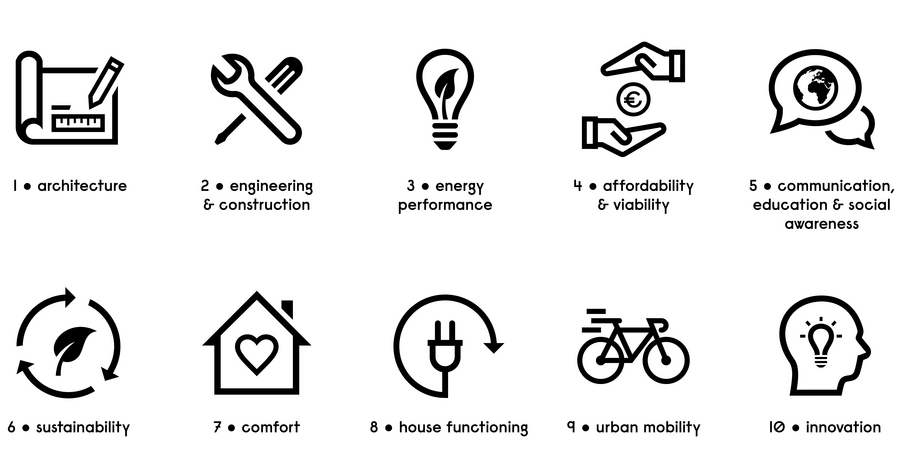Ten contests
As in the Olympic decathlon, the teams of the Solar Decathlon Europe will compete in ten contests. The team which achieves the highest combined score will win. The main focus of the ten contests is determined by the venue and specific emphasis of the current year’s competition. For the Solar Decathlon Europe 21/22 (SDE 21/22), the main emphasis lies on sustainable urban building and living.

Teams will be scored on the Design Challenge, evaluating the overall concept of the building, as well as on the Building Challenge. Depending on the contest, scoring will either be made up of measurements or scores from a jury composed of international experts. Team RoofKIT from Karlsruhe, which achieved the highest total score in the end, won.
Sub-contests
Site Integration ● Building Design ● Interiour & Lighting Design ● Solar System Integration
Objective
The contest Architecture focuses on the design and functionality of the building designs and the referring House Demonstration Units (HDU). The aim is to show innovative designs in a real urban context and to include solutions for the neighbourhood and the district. For the HDU great emphasison the aesthetics of the spaces and materials is made. Innovative and sustainable constructions designed for the buildings of the future were awarded. The teams have been encouraged to develop intelligent solutions for the integration of solar energy systems into the building shell.
Assessment
Design & Building Challenge ● Jury
Sub-contests
Energy Concept ● Performance Analysis ● Life Cycle Carbon Footprint
Objective
The planning and implementation of technical and structural concepts are in the focus of this contest. The level of architectural integration and the appropriateness of the concepts in terms of climate-neutral building operation are evaluated.
Assessment
Design & Building Challenge ● Jury
Sub-contests
Energy Consumption ● Energy Balance ● Self-Consumption ● PV System Performance ● Grid Interaction
Objective
This contest deals with the energy consumption and solar energy supply of the House Demonstration Units in realistic operation mode. The data obtained during the competition phase will be scientifically processed and published afterwards.
Assessment
Building Challenge ● Monitoring
Sub-contests
Affordability ● Viability
Objective
The degree of the feasibility of the project is evaluated concerning the economic and socio-economic context. The contest focusses on how the project can be implemented financially by investors and residents. Furthermore, the contribution to the solution of urban challenges with regard to residents and at a neighbourhood level is considered.
Assessment
Design & Building Challenge ● Jury
Sub-contests
Communication ● Education ● Social Awareness
Objective
This contest deals with the communication, education and empowerment strategies developed and implemented by the teams. By addressing and integrating different target groups at an early stage, the aim is to inform as many people as possible and to get them enthusiastic about the urban energy transition.
Assessment
Design & Building Challenge ● Jury
Sub-contests
Circularity ● Sufficiency, Flexibility & Environmental Performance
Objective
The contest evaluates the measures for an optimized recycling economy and a sustainable building concept. It includes the saving of resources and the avoidance of demolition waste by means of a building that is suitable for dismantling and recycling. Material recycling potentials are identified and demonstrated. The buildings react to current challenges with future-oriented concepts. Solutions are sought to issues such as demographic transition, changes in social coexistence, dwindling biodiversity and the urban microclimate.
Assessment
Design & Building Challenge ● Jury
Sub-contests
Temperature ● Humidity ● Air Quality (CO₂) ● Lighting ● Sound Insulation ● Air Tightness ● Performance Gap
Objective
The interior comfort of the House Demonstration Units without the use of active heating or cooling under the current climatic conditions of the SDE 21/22 competition site is measured in this contest. For this purpose, temperature, humidity, sound insulation, lighting and indoor air quality are checked.
Assessment
Building Challenge ● Monitoring
Sub-contests
Refrigeration ● Freezing ● Washing ● Drying ● Dishwashing ● Oven ● Cooking ● Home Electronics ● Hot Water ● Water Balance ● Dinner ● User-Friendliness
Objective
In this contest, the operation of a modern apartment is to be simulated. It is about the functionality and efficiency of the selected household appliances for maximum efficiency while considering today’s demands. The teams are to develop innovative solutions for the performance of all necessary household appliances. The operation of the appliances determines the main energy load of the House Demonstration Units during the competition phase. It is of great importance for the total energy consumption of the respective project.
Assessment
Building Challenge ● Monitoring
Sub-contests
Mobility Concept ● Provide Beverages ● Provide For Dinners ● Retrieve Food
Objective
The aim of this contest is to develop an adequate and needs-based mobility concept for the district in which the project is located. The concept should help to reduce car traffic and at the same time, meet the mobility needs of the neighbourhood residents.
Assessment
Design & Building Challenge ● Jury
Sub-contests
Architecture ● Engineering & Construction ● Affordability & Viability ● Sustainability ● Urban Mobility
Zielsetzung
This contest is closely linked to the other disciplines. It is about the degree of innovation of the designs and House Demonstration Units, which is evaluated by the jury members of the Contests Architecture, Engineering & Construction, Sustainability, Affordability & Viability and UrbanMobility.
Bewertung
Design & Building Challenge ● 5 Juries
